2022年中考英语二轮专题复习课件:专题五 介词和介词短语(共有35张PPT)
文档属性
| 名称 | 2022年中考英语二轮专题复习课件:专题五 介词和介词短语(共有35张PPT) |  | |
| 格式 | zip | ||
| 文件大小 | 188.0KB | ||
| 资源类型 | 教案 | ||
| 版本资源 | 人教新目标(Go for it)版 | ||
| 科目 | 英语 | ||
| 更新时间 | 2022-02-05 12:19:13 | ||
图片预览

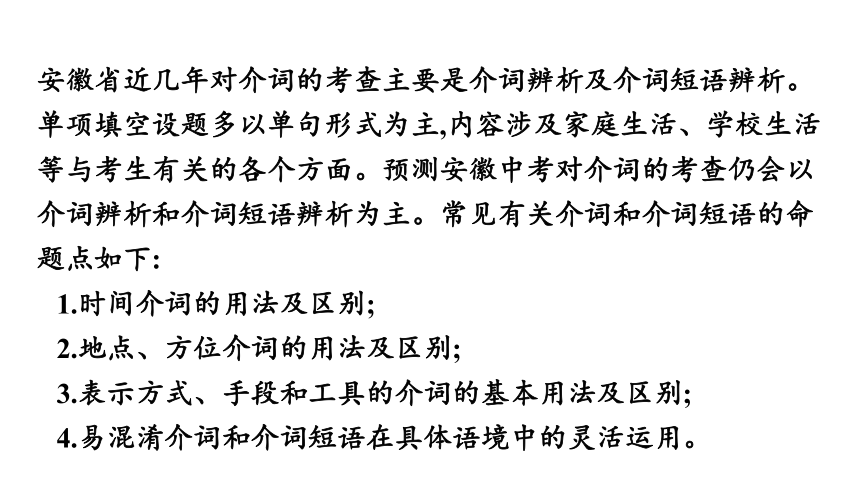
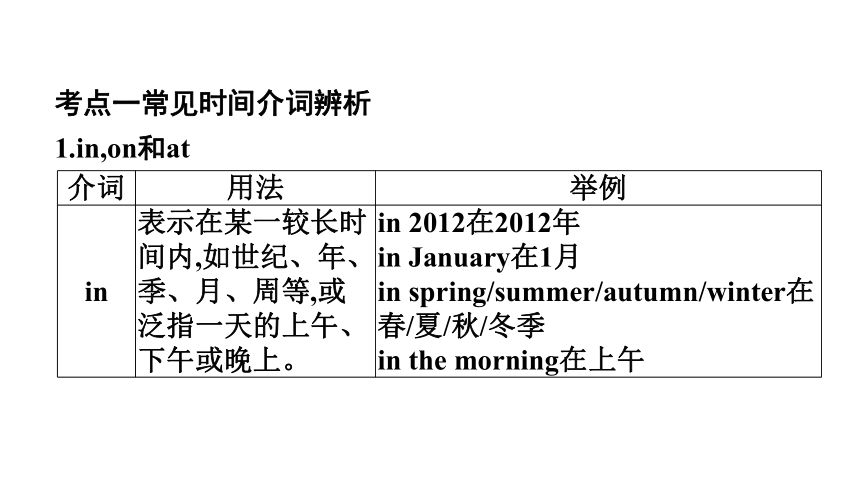
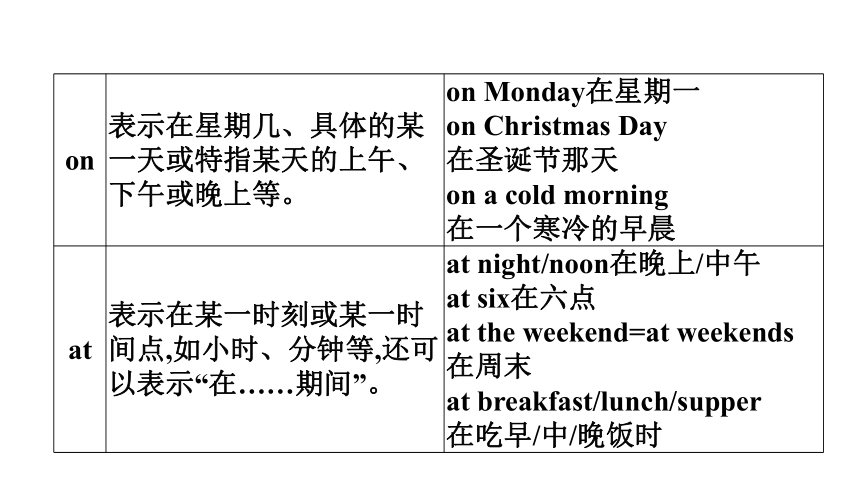
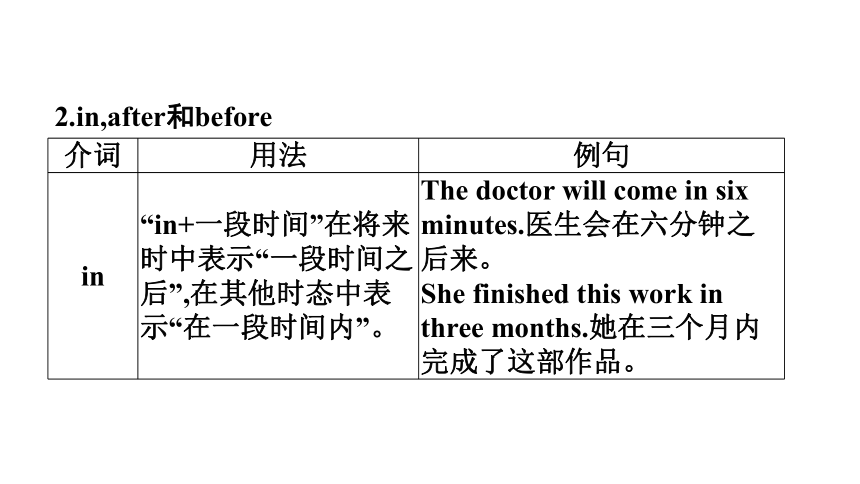
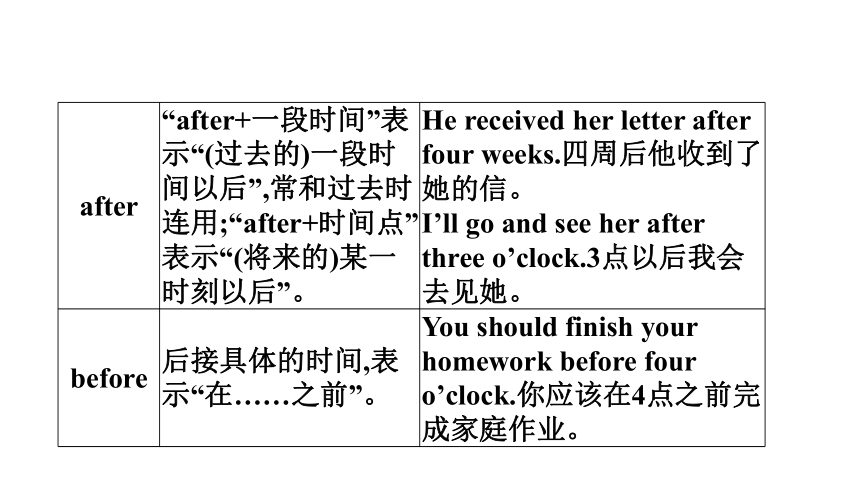
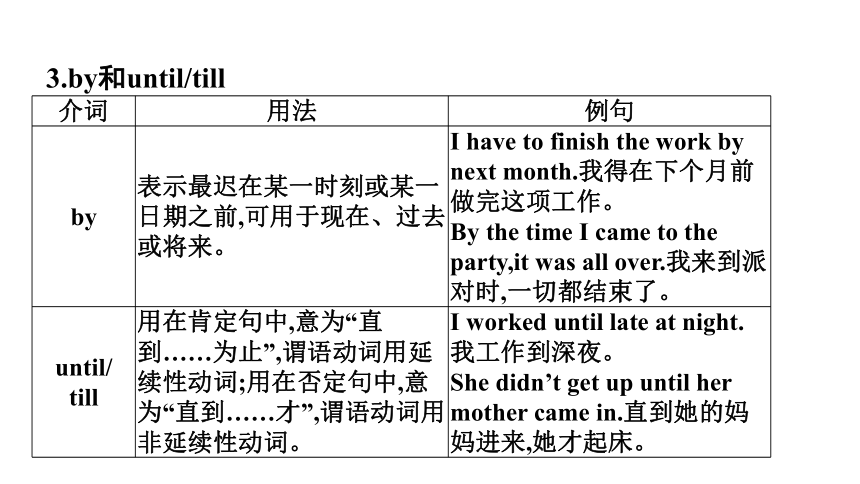
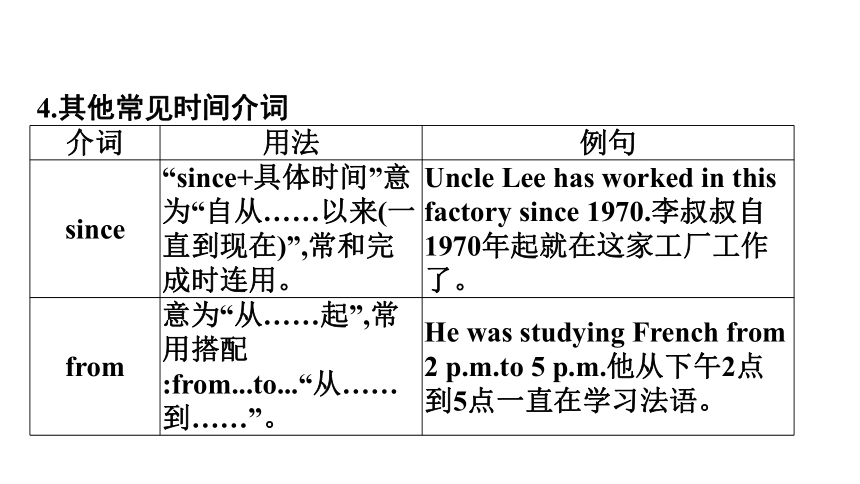
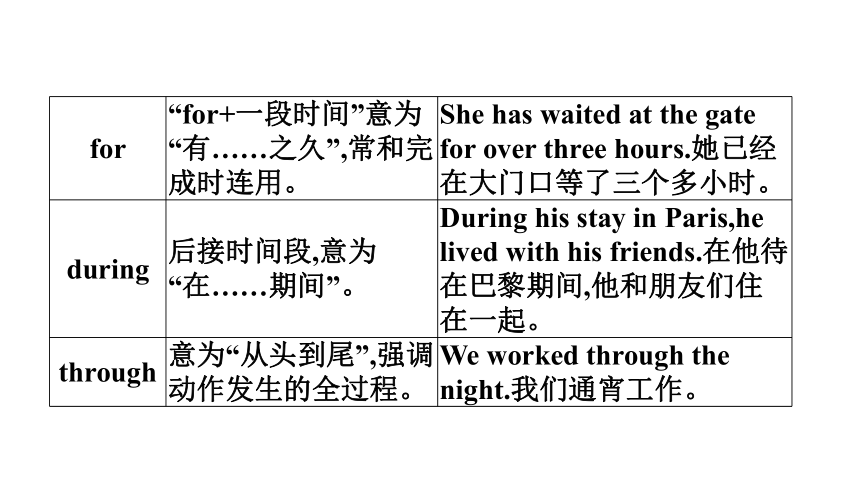
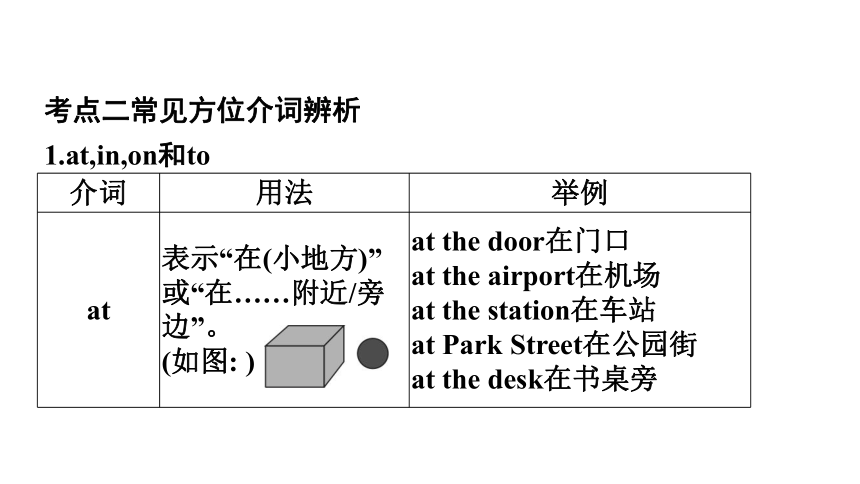
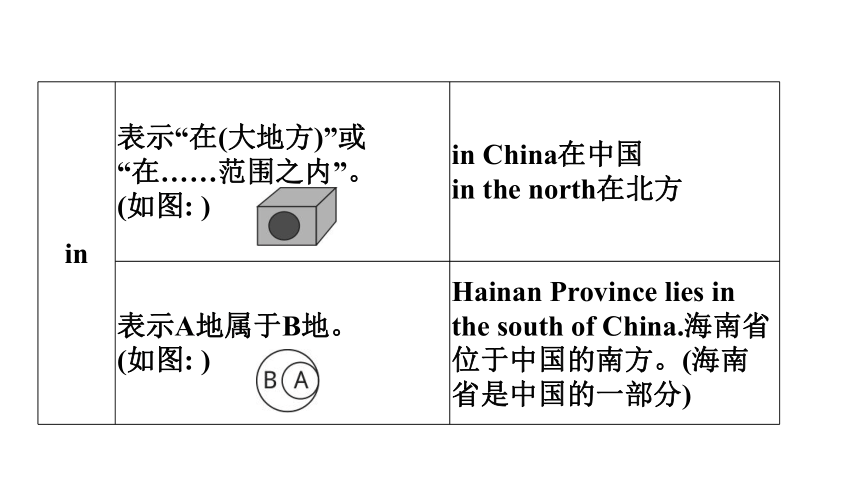
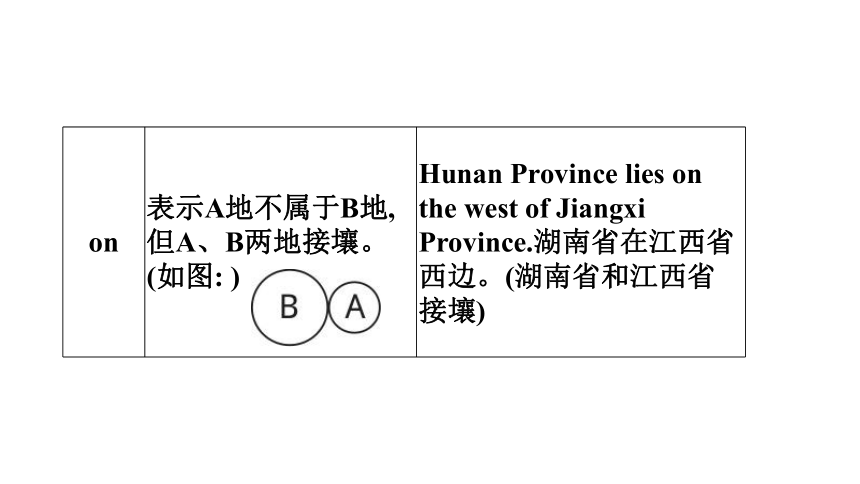
文档简介
(共35张PPT)
专题五 介词和介词短语
安徽省近几年对介词的考查主要是介词辨析及介词短语辨析。单项填空设题多以单句形式为主,内容涉及家庭生活、学校生活等与考生有关的各个方面。预测安徽中考对介词的考查仍会以介词辨析和介词短语辨析为主。常见有关介词和介词短语的命题点如下:
1.时间介词的用法及区别;
2.地点、方位介词的用法及区别;
3.表示方式、手段和工具的介词的基本用法及区别;
4.易混淆介词和介词短语在具体语境中的灵活运用。
考点一常见时间介词辨析
1.in,on和at
介词 用法 举例
in 表示在某一较长时间内,如世纪、年、季、月、周等,或泛指一天的上午、下午或晚上。 in 2012在2012年
in January在1月
in spring/summer/autumn/winter在春/夏/秋/冬季
in the morning在上午
on 表示在星期几、具体的某一天或特指某天的上午、下午或晚上等。 on Monday在星期一
on Christmas Day
在圣诞节那天
on a cold morning
在一个寒冷的早晨
at 表示在某一时刻或某一时间点,如小时、分钟等,还可以表示“在……期间”。 at night/noon在晚上/中午
at six在六点
at the weekend=at weekends在周末
at breakfast/lunch/supper
在吃早/中/晚饭时
2.in,after和before
介词 用法 例句
in “in+一段时间”在将来时中表示“一段时间之后”,在其他时态中表示“在一段时间内”。 The doctor will come in six minutes.医生会在六分钟之后来。
She finished this work in three months.她在三个月内完成了这部作品。
after “after+一段时间”表示“(过去的)一段时间以后”,常和过去时连用;“after+时间点”表示“(将来的)某一时刻以后”。 He received her letter after four weeks.四周后他收到了她的信。
I’ll go and see her after three o’clock.3点以后我会去见她。
before 后接具体的时间,表示“在……之前”。 You should finish your homework before four o’clock.你应该在4点之前完成家庭作业。
3.by和until/till
介词 用法 例句
by 表示最迟在某一时刻或某一日期之前,可用于现在、过去或将来。 I have to finish the work by next month.我得在下个月前做完这项工作。
By the time I came to the party,it was all over.我来到派对时,一切都结束了。
until/ till 用在肯定句中,意为“直到……为止”,谓语动词用延续性动词;用在否定句中,意为“直到……才”,谓语动词用非延续性动词。 I worked until late at night.我工作到深夜。
She didn’t get up until her mother came in.直到她的妈妈进来,她才起床。
4.其他常见时间介词
介词 用法 例句
since “since+具体时间”意为“自从……以来(一直到现在)”,常和完成时连用。 Uncle Lee has worked in this factory since 1970.李叔叔自1970年起就在这家工厂工作了。
from 意为“从……起”,常用搭配:from...to...“从……到……”。 He was studying French from 2 p.m.to 5 p.m.他从下午2点到5点一直在学习法语。
for “for+一段时间”意为“有……之久”,常和完成时连用。 She has waited at the gate for over three hours.她已经在大门口等了三个多小时。
during 后接时间段,意为“在……期间”。 During his stay in Paris,he lived with his friends.在他待在巴黎期间,他和朋友们住在一起。
through 意为“从头到尾”,强调动作发生的全过程。 We worked through the night.我们通宵工作。
考点二常见方位介词辨析
1.at,in,on和to
介词 用法 举例
at 表示“在(小地方)”或“在……附近/旁边”。 (如图: ) at the door在门口
at the airport在机场
at the station在车站
at Park Street在公园街
at the desk在书桌旁
in 表示“在(大地方)”或“在……范围之内”。 (如图: ) in China在中国
in the north在北方
表示A地属于B地。 (如图: ) Hainan Province lies in the south of China.海南省位于中国的南方。(海南省是中国的一部分)
on 表示A地不属于B地,但A、B两地接壤。 (如图: ) Hunan Province lies on the west of Jiangxi Province.湖南省在江西省西边。(湖南省和江西省接壤)
to 表示“到……”。 This road leads to London.这条路通向伦敦。
表示“在……范围之外”,即A、B两地不接壤。 (如图: ) Japan lies to the east of China.日本位于中国东边。(日本在中国的范围之外,且和中国不接壤)
2.on,above,below,over和under
介词 用法 例句
on 表示“在……上面”,与物体表面接触。 (如图: ) He puts his watch on the desk.他把手表放在书桌上。
above 表示“在……上方”,不强调是否垂直,且不与表面接触,同below相对。 (如图: ) The bird is flying above my head.鸟儿从我头顶飞过。
below 与above 反义,表示非垂直且不与表面接触的下方。 (如图: ) There is a lake below the mountain.山下有一个湖。
over 表示“在……(垂直的)正上方”,与物体表面不直接接触,同under相对。 (如图: ) There is a bridge over the river.河上有一座桥。
under 与over 反义,表示垂直且不与表面接触的下方。 (如图: ) I want to have a rest under the tree.我想在树下休息一会儿。
3.through,across,over和past
介词 用法 例句
through 表示从物体内部穿过,如管道、门窗、人群、树林等。 The visitors went through a big gate into another park.
游客们穿过一扇大门来到另一个公园。
across 表示从物体表面穿过,如街道、河流等。 He walked across the street.他穿过街道。
over 表示从物体上方越过,如墙、山等。 They climbed over the mountain and arrived there ahead of time.
他们翻过大山,提前到达了那里。
past 意为“经过”,表示从旁边经过。 They went past the supermarket yesterday.
他们昨天从超市旁边经过了。
4.between和among
介词 用法 例句
between 通常表示“两者之间”,常用搭配between...and...意为“在……和……之间”。 Ann is standing between Tom and Bill.安站在汤姆和比尔之间。
among 表示“在三者或三者以上之间”。 They walked among the crowds in Red Square.他们在熙熙攘攘的红场散步。
5.其他常见方位介词
介词 用法 例句
behind 意为“在……后面”。 Tom sits behind Mary.
汤姆坐在玛丽后面。
beside 意为“在……旁边”。 There is a tree beside the house.房子旁边有一棵树。
against 意为“靠着;与……相反;反对”。 Place the ladder against the wall.把梯子靠墙放。
along 意为“顺着;沿着”。 Walk along the road,and you will see a bank on the left.沿着这条路往前走,你会在左手边看到一家银行。
around 意为“四周;在……周围”。 Would you like to walk around the factory this afternoon 你想今天下午到工厂的周围走走吗
考点三常见方式介词辨析
介词 用法 例句
by 表示“用……方式、工具或手段”。 The house is heated by gas.这房子是煤气供暖的。
后可接表示交通工具的名词,该名词用单数形式且前面不加冠词或任何修饰成分。 by sea乘船
by air乘飞机
by bus/train/car/taxi乘公交车/火车/汽车/出租车
in 后接表示某种材料、语言、文字或声音的名词,表示“用……”。名词前不用冠词或修饰语。 Please write that article in English.请用英语写那篇文章。
She wrote her homework in pencil.她用铅笔写家庭作业。
后接表示交通工具的名词,该名词前应有冠词、物主代词或指示代词等修饰语。 in the bus/train/car/taxi乘公交车/火车/汽车/出租车
on 表示“以……方式”,后接手段、通讯方式等。 You’re wanted on the phone.有人打电话找你。
后接表示交通工具的名词,该名词前应有冠词、物主代词或指示代词等修饰语;有时用于某些固定搭配中。注意表示骑马、骑自行车等时,应用介词on。 on the plane/bus/coach乘飞机/公交车/长途汽车
on a bike/boat/horse骑自行车/乘船/骑马
on foot步行
with 后接某种具体的工具或手段。 We see with our eyes and walk with our feet.我们用眼睛看东西,用双脚走路。
考点四其他易混淆的介词辨析
1.as和like
介词 用法 例句
as 表示“像;如同”。 They were all dressed as clowns.他们都打扮成小丑。
表示“作为……”,后接职业、职务、作用等。 Let me speak to you as a father.我以父亲的身份和你讲话。(说话者是听话者的父亲)
like 表示“像……一样”,多指在某些方面相像。 Let me speak to you like a father.让我像一位父亲一样和你讲话。(说话者不是听话者的父亲)
2.with和without
介词 用法 例句
with 表示伴随,意为“随着;和……一起”。 The risk of illnesses increases with age.患病的风险随着年龄的增加而增加。
I’m sure you’ll be safe with us.我确定你和我们在一起是安全的。
without 意为“没有”,和with意思相反。 He went out without his umbrella.他外出没有带伞。
3.except,besides和but
介词 用法 例句
except 意为“除……之外”,指从整体中排除except后所接的人或事物,通常不能置于句首。 Everyone went to the Palace Museum except Tom.除了汤姆,大家都去了故宫博物院。(汤姆没有去)
besides 意为“除……之外(还)”,指在原来的基础上再加上besides后接的人或者事物。 There were a lot of people at the party besides us.除了我们以外,晚会上还有许多(其他)人。
but 意为“除了,除……之外”。 Everyone was there but him.除了他之外,大家都在。
考点五介词短语
1.常见in短语
in all/short总而言之
in case以防万一
in common公有(的);共有(的)
in future今后;以后
in doubt怀疑
in turn依次;轮流
in need在困难中
in peace和平地;平静地
in person亲自
in general通常;大体上;一般而言
in order按顺序
in public当众;公开
in good health身体健康
in the end最后;终于
in the future在未来;在将来
in the past在过去
in the way挡道的;妨碍人的
in this way用这种方式
in other words换句话说
in no way决不
in no time立刻;马上
in a minute一会儿;立刻
in the beginning起初
in front of在……(外部)前面
in the front of在……(内部)前面
2.常见on短语
on board在船(或飞机、火车)上
on holiday在度假
on purpose故意地
on sale廉价出售;出售
on show展出;在上演/放映
on the phone用电话交谈;在通话
on the left/right在左/右边
on the way在路上
on the one hand (在)一方面
on the other hand (在)另一方面
3.常见at短语
at birth出生时
at dinner/supper晚饭时
at hand在附近;在手边
at first首先
at last最后;终于
at least至少;最少
at most最多
at times有时;偶尔
at present目前;现在
at the moment此时;现在
at the age of在……岁时
at the beginning of在……开始
4.其他常见介词短语
instead of代替;而不是
because of因为
by mistake错误地
by accident偶然地;意外地
by the time到……时候;在……之前
to be honest (作插入语)老实说;说实在的
to one’s surprise令某人惊讶的是……
to start/begin with(作插入语)首先
out of breath气喘吁吁
out of control不受控制
out of danger脱离危险
out of the way不挡道;不妨碍
专题五 介词和介词短语
安徽省近几年对介词的考查主要是介词辨析及介词短语辨析。单项填空设题多以单句形式为主,内容涉及家庭生活、学校生活等与考生有关的各个方面。预测安徽中考对介词的考查仍会以介词辨析和介词短语辨析为主。常见有关介词和介词短语的命题点如下:
1.时间介词的用法及区别;
2.地点、方位介词的用法及区别;
3.表示方式、手段和工具的介词的基本用法及区别;
4.易混淆介词和介词短语在具体语境中的灵活运用。
考点一常见时间介词辨析
1.in,on和at
介词 用法 举例
in 表示在某一较长时间内,如世纪、年、季、月、周等,或泛指一天的上午、下午或晚上。 in 2012在2012年
in January在1月
in spring/summer/autumn/winter在春/夏/秋/冬季
in the morning在上午
on 表示在星期几、具体的某一天或特指某天的上午、下午或晚上等。 on Monday在星期一
on Christmas Day
在圣诞节那天
on a cold morning
在一个寒冷的早晨
at 表示在某一时刻或某一时间点,如小时、分钟等,还可以表示“在……期间”。 at night/noon在晚上/中午
at six在六点
at the weekend=at weekends在周末
at breakfast/lunch/supper
在吃早/中/晚饭时
2.in,after和before
介词 用法 例句
in “in+一段时间”在将来时中表示“一段时间之后”,在其他时态中表示“在一段时间内”。 The doctor will come in six minutes.医生会在六分钟之后来。
She finished this work in three months.她在三个月内完成了这部作品。
after “after+一段时间”表示“(过去的)一段时间以后”,常和过去时连用;“after+时间点”表示“(将来的)某一时刻以后”。 He received her letter after four weeks.四周后他收到了她的信。
I’ll go and see her after three o’clock.3点以后我会去见她。
before 后接具体的时间,表示“在……之前”。 You should finish your homework before four o’clock.你应该在4点之前完成家庭作业。
3.by和until/till
介词 用法 例句
by 表示最迟在某一时刻或某一日期之前,可用于现在、过去或将来。 I have to finish the work by next month.我得在下个月前做完这项工作。
By the time I came to the party,it was all over.我来到派对时,一切都结束了。
until/ till 用在肯定句中,意为“直到……为止”,谓语动词用延续性动词;用在否定句中,意为“直到……才”,谓语动词用非延续性动词。 I worked until late at night.我工作到深夜。
She didn’t get up until her mother came in.直到她的妈妈进来,她才起床。
4.其他常见时间介词
介词 用法 例句
since “since+具体时间”意为“自从……以来(一直到现在)”,常和完成时连用。 Uncle Lee has worked in this factory since 1970.李叔叔自1970年起就在这家工厂工作了。
from 意为“从……起”,常用搭配:from...to...“从……到……”。 He was studying French from 2 p.m.to 5 p.m.他从下午2点到5点一直在学习法语。
for “for+一段时间”意为“有……之久”,常和完成时连用。 She has waited at the gate for over three hours.她已经在大门口等了三个多小时。
during 后接时间段,意为“在……期间”。 During his stay in Paris,he lived with his friends.在他待在巴黎期间,他和朋友们住在一起。
through 意为“从头到尾”,强调动作发生的全过程。 We worked through the night.我们通宵工作。
考点二常见方位介词辨析
1.at,in,on和to
介词 用法 举例
at 表示“在(小地方)”或“在……附近/旁边”。 (如图: ) at the door在门口
at the airport在机场
at the station在车站
at Park Street在公园街
at the desk在书桌旁
in 表示“在(大地方)”或“在……范围之内”。 (如图: ) in China在中国
in the north在北方
表示A地属于B地。 (如图: ) Hainan Province lies in the south of China.海南省位于中国的南方。(海南省是中国的一部分)
on 表示A地不属于B地,但A、B两地接壤。 (如图: ) Hunan Province lies on the west of Jiangxi Province.湖南省在江西省西边。(湖南省和江西省接壤)
to 表示“到……”。 This road leads to London.这条路通向伦敦。
表示“在……范围之外”,即A、B两地不接壤。 (如图: ) Japan lies to the east of China.日本位于中国东边。(日本在中国的范围之外,且和中国不接壤)
2.on,above,below,over和under
介词 用法 例句
on 表示“在……上面”,与物体表面接触。 (如图: ) He puts his watch on the desk.他把手表放在书桌上。
above 表示“在……上方”,不强调是否垂直,且不与表面接触,同below相对。 (如图: ) The bird is flying above my head.鸟儿从我头顶飞过。
below 与above 反义,表示非垂直且不与表面接触的下方。 (如图: ) There is a lake below the mountain.山下有一个湖。
over 表示“在……(垂直的)正上方”,与物体表面不直接接触,同under相对。 (如图: ) There is a bridge over the river.河上有一座桥。
under 与over 反义,表示垂直且不与表面接触的下方。 (如图: ) I want to have a rest under the tree.我想在树下休息一会儿。
3.through,across,over和past
介词 用法 例句
through 表示从物体内部穿过,如管道、门窗、人群、树林等。 The visitors went through a big gate into another park.
游客们穿过一扇大门来到另一个公园。
across 表示从物体表面穿过,如街道、河流等。 He walked across the street.他穿过街道。
over 表示从物体上方越过,如墙、山等。 They climbed over the mountain and arrived there ahead of time.
他们翻过大山,提前到达了那里。
past 意为“经过”,表示从旁边经过。 They went past the supermarket yesterday.
他们昨天从超市旁边经过了。
4.between和among
介词 用法 例句
between 通常表示“两者之间”,常用搭配between...and...意为“在……和……之间”。 Ann is standing between Tom and Bill.安站在汤姆和比尔之间。
among 表示“在三者或三者以上之间”。 They walked among the crowds in Red Square.他们在熙熙攘攘的红场散步。
5.其他常见方位介词
介词 用法 例句
behind 意为“在……后面”。 Tom sits behind Mary.
汤姆坐在玛丽后面。
beside 意为“在……旁边”。 There is a tree beside the house.房子旁边有一棵树。
against 意为“靠着;与……相反;反对”。 Place the ladder against the wall.把梯子靠墙放。
along 意为“顺着;沿着”。 Walk along the road,and you will see a bank on the left.沿着这条路往前走,你会在左手边看到一家银行。
around 意为“四周;在……周围”。 Would you like to walk around the factory this afternoon 你想今天下午到工厂的周围走走吗
考点三常见方式介词辨析
介词 用法 例句
by 表示“用……方式、工具或手段”。 The house is heated by gas.这房子是煤气供暖的。
后可接表示交通工具的名词,该名词用单数形式且前面不加冠词或任何修饰成分。 by sea乘船
by air乘飞机
by bus/train/car/taxi乘公交车/火车/汽车/出租车
in 后接表示某种材料、语言、文字或声音的名词,表示“用……”。名词前不用冠词或修饰语。 Please write that article in English.请用英语写那篇文章。
She wrote her homework in pencil.她用铅笔写家庭作业。
后接表示交通工具的名词,该名词前应有冠词、物主代词或指示代词等修饰语。 in the bus/train/car/taxi乘公交车/火车/汽车/出租车
on 表示“以……方式”,后接手段、通讯方式等。 You’re wanted on the phone.有人打电话找你。
后接表示交通工具的名词,该名词前应有冠词、物主代词或指示代词等修饰语;有时用于某些固定搭配中。注意表示骑马、骑自行车等时,应用介词on。 on the plane/bus/coach乘飞机/公交车/长途汽车
on a bike/boat/horse骑自行车/乘船/骑马
on foot步行
with 后接某种具体的工具或手段。 We see with our eyes and walk with our feet.我们用眼睛看东西,用双脚走路。
考点四其他易混淆的介词辨析
1.as和like
介词 用法 例句
as 表示“像;如同”。 They were all dressed as clowns.他们都打扮成小丑。
表示“作为……”,后接职业、职务、作用等。 Let me speak to you as a father.我以父亲的身份和你讲话。(说话者是听话者的父亲)
like 表示“像……一样”,多指在某些方面相像。 Let me speak to you like a father.让我像一位父亲一样和你讲话。(说话者不是听话者的父亲)
2.with和without
介词 用法 例句
with 表示伴随,意为“随着;和……一起”。 The risk of illnesses increases with age.患病的风险随着年龄的增加而增加。
I’m sure you’ll be safe with us.我确定你和我们在一起是安全的。
without 意为“没有”,和with意思相反。 He went out without his umbrella.他外出没有带伞。
3.except,besides和but
介词 用法 例句
except 意为“除……之外”,指从整体中排除except后所接的人或事物,通常不能置于句首。 Everyone went to the Palace Museum except Tom.除了汤姆,大家都去了故宫博物院。(汤姆没有去)
besides 意为“除……之外(还)”,指在原来的基础上再加上besides后接的人或者事物。 There were a lot of people at the party besides us.除了我们以外,晚会上还有许多(其他)人。
but 意为“除了,除……之外”。 Everyone was there but him.除了他之外,大家都在。
考点五介词短语
1.常见in短语
in all/short总而言之
in case以防万一
in common公有(的);共有(的)
in future今后;以后
in doubt怀疑
in turn依次;轮流
in need在困难中
in peace和平地;平静地
in person亲自
in general通常;大体上;一般而言
in order按顺序
in public当众;公开
in good health身体健康
in the end最后;终于
in the future在未来;在将来
in the past在过去
in the way挡道的;妨碍人的
in this way用这种方式
in other words换句话说
in no way决不
in no time立刻;马上
in a minute一会儿;立刻
in the beginning起初
in front of在……(外部)前面
in the front of在……(内部)前面
2.常见on短语
on board在船(或飞机、火车)上
on holiday在度假
on purpose故意地
on sale廉价出售;出售
on show展出;在上演/放映
on the phone用电话交谈;在通话
on the left/right在左/右边
on the way在路上
on the one hand (在)一方面
on the other hand (在)另一方面
3.常见at短语
at birth出生时
at dinner/supper晚饭时
at hand在附近;在手边
at first首先
at last最后;终于
at least至少;最少
at most最多
at times有时;偶尔
at present目前;现在
at the moment此时;现在
at the age of在……岁时
at the beginning of在……开始
4.其他常见介词短语
instead of代替;而不是
because of因为
by mistake错误地
by accident偶然地;意外地
by the time到……时候;在……之前
to be honest (作插入语)老实说;说实在的
to one’s surprise令某人惊讶的是……
to start/begin with(作插入语)首先
out of breath气喘吁吁
out of control不受控制
out of danger脱离危险
out of the way不挡道;不妨碍
同课章节目录
- 词法
- 名词
- 动词和动词短语
- 动词语态
- 动词时态
- 助动词和情态动词
- 非谓语动词
- 冠词
- 代词
- 数词和量词
- 形容词副词及其比较等级
- 介词和介词短语
- 连词和感叹词
- 构词法
- 相似、相近词比较
- 句法
- 陈述句
- 一般疑问句和否定疑问句
- 特殊疑问句及选择疑问句
- 反意疑问句
- 存在句(There be句型)
- 宾语从句
- 定语从句
- 状语从句
- 主谓一致问题
- 简单句
- 并列句
- 复合句
- 主谓一致
- 主、表语从句
- 名词性从句
- 直接引语和间接引语
- 虚拟语气
- 感叹句
- 强调句
- 倒装句
- 祈使句
- 句子的成分
- 句子的分类
- 题型专区
- 单项选择部分
- 易错题
- 完形填空
- 阅读理解
- 词汇练习
- 听说训练
- 句型转换
- 补全对话
- 短文改错
- 翻译
- 书面表达
- 任务型阅读
- 语法填空
- 其他资料
